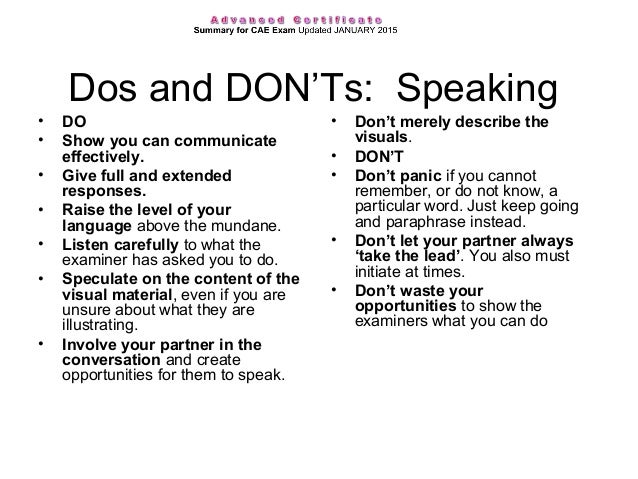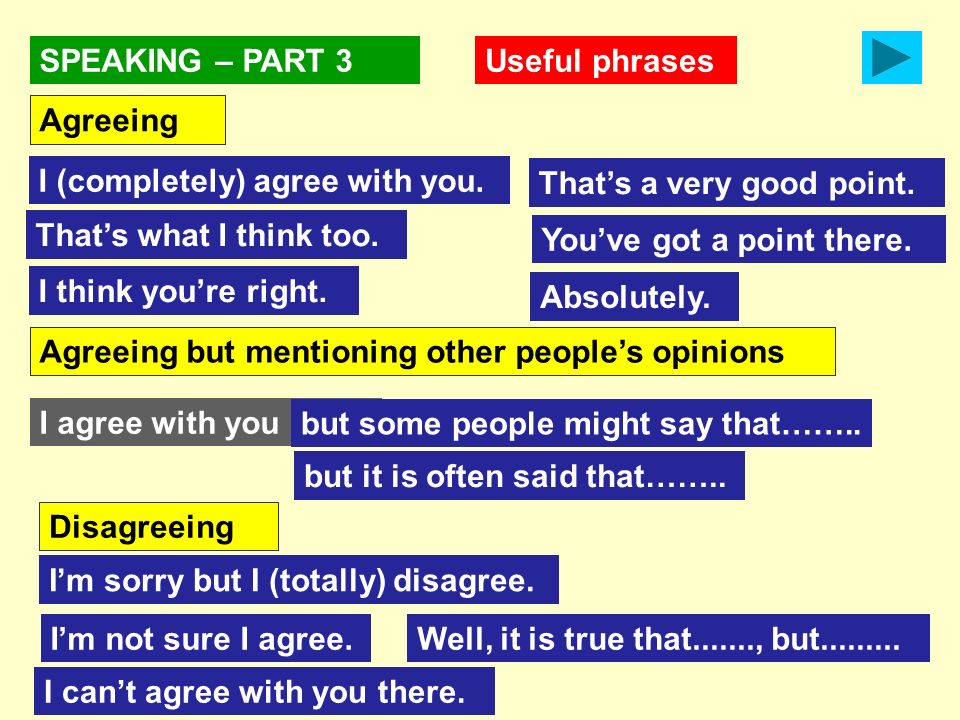Examiners will be evaluating your ability for the following areas:
*Initiating and responding. It is really important to be able to start a conversation with your partner/s and responde to questions with the appropriate extent!You should be able to form simple questions well. The key is to use simple questions such as, “Do you enjoy watching TV?” and to focus on giving a simple, fluent and extended answer (20-30 seconds). Your answer in the exam should be with mostly simple grammar forms that you have practiced during the course and the vocabulary should be only what you are sure of using. DO NOT EXPERIMENT WITH NEW WORDS IN THE EXAM!
*Using question tags: question tags are used as a way of forming informal questions, asking for confirmation or agreement.
I reckon that it is an easy exam, don´t you?
I think this is the best option, isn't it?
*Giving reasons for your answers, justifying your opinions, giving concrete examples:. You should always give a reason for your answers with a simple connective such as because, but or for example. This will help you to extend your speech and also, to show confidence and fluency.
*Making suggestions: An important part of the exam is suggesting. You need to be able to suggest different options to later talk about them. For example, Why don't we talk about…? How about (…ing)?
*Negotiating towards a conclusion, result or outcome: It is very important to negotiate an outcome in Part 3 and 4. This means to give a result. What you need to do is find a conclusion by showing agreement or disagreement. A good thing to know is how to express strong agreement or disagreement.
Agreeing:
- Exactly!
- I couldn’t agree more!
- You took the words out of my mouth!
- I see your point.
- I get what you mean.
- We see eye to eye.
- I understand your point of view.
Disagreeing:
- Not really!
- Not quite!
- I'm afraid I don't quite agree on that point!
- I'm afraid I see it differently.
- Really?
- What are you on about?
- I can't agree with you on that.
More useful language for interaction:
- In my opinion, …
- In my eyes, …
- To my mind, …
- As far as I am concerned, …
- Speaking personally, …
- From my point of view, …
- As for me / As to me, …
- My view / opinion / belief / impression / conviction is that
- I hold the view that …
- I would say that …
- It seems to me that …
- I am of the opinion that …
- My impression is that …
- I am under the impression that …
- It is my impression that …
- I have the feeling that …
- My own feeling on the subject is that …
- I have no doubt that …
- I am sure / I am certain that …
- I think / consider / find / feel / believe / suppose / presume / assume/reckon that …
- I hold the opinion that …
- I dare say that …
- I guess that …
- I bet that ….
- I gather that …
- It goes without saying that …
Coming to a conclusion:
- In conclusion, ...
- To sum up, ...
- Finally, ...
- As you can see, that’s why I think we should go for… ,
- In brief, ...
- On the whole, ...
- All in all, ...
- To round up, ...
*Expressing purpose; It is important to know how to state the purpose or the reason for something: Here are some examples:
Infinitive: I am learning English to get a good job.
So that: I am learning English so that I can get a good job.
In order to: I am learning English in order to get a good job.
*Developing and extending speech. An important part of speech is being able to develop you answer. This is when you make a topic more interesting by linking it to your own ideas and opinions. It is best to use the 1st or 2nd conditional.
E.g. If we go to the zoo, we will see lots of interesting animals and I love animals. But we won't go unless it stops raining.
*Linking ideas: In speaking Part 2 and 4 it is a good idea to start linking ideas. Use connectors and expressions such as:
- As/Like you have said…,
- According to you…,
- With respect to what you have said about…
*Persuading or convincing people to agree with you is important in Part 2. When you are talking about the situation, it is important to know how to convince your partner to agree with you. It doesn’t matter if you agree or not but you need to express your opinion so that they might agree with you.
Persuading: Don´t you think we should…? Wouldn't it be a good idea to…?
You need to be able to express changes in likes and dislikes (past and present). You need to be able to talk about how you opinions, likes and dislikes have changed. A great way is by using USED TO. This should that something has changed.
E.g. I used to do sport every day but now I only do it once a week.
*There are various ways of saying like, try to vary them. It is better to use the gerund (ing) after them.
LIKE = enjoy, love, be keen on, be fond of, be into, be a fan of, be big on, be crazy about
DISLIKE = hate, detest, loathe, despise, can´t stand
*Speculating is needed to talk about things that are probable or that maybe will occur. Use modal verbs such as may/might/could. This will add a degree of uncertainty to your speech and allow margin for discussion.
The key to doing well in this part of the exam is to give a good first impression. You must speak with extended, fluent and confident answers.



